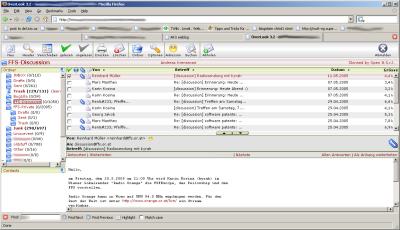Wednesday, June 29. 2005
No, I don't expect any meaningful answer nor any understanding for my point of view, but it just had to be said.
From: Andreas Krennmair <ak@synflood.at>
To: ron@christianministriesintl.org, jason@christianministriesintl.org
Subject: Regarding your article "Islam: a beautiful and peaceful religion?"
Hello,
I came across your article "Islam: a beautiful and peaceful religion?" and would like to comments a few things you mentioned in there.
First of all, your article seems to imply to Christianity is a religion that leads to freedom, justice and prosperity. This is definitely not true. Freedom, justice and prosperity started to develop in the western world during the Age of Enlightenment. This was the time when first signs of religious freedom together with the idea of separation of church and state came up.
But comes up when state and church more or less build on each other can be seen in the terror and arbitrariness in the middle ages, when Christiany was at its peak (at that time), and acts like witch burning and the four inquisitions were established. At his time, not a single "society characterized by freedom, justice and prosperity" could be produced, at least not in the Western world.
The Islamic world just hasn't got into their Age of Enlightenment yet. Nor did the Christian world when it was as old as the Islamic world is now.
I would also to comment on the "hatred of Jews and Christians" you claim the Islam to spread. Well, you're taking the view of a few extremists whose interpretation of Koran is worthy of discussion (as with many religious writings, Koran contradicts itself several times in several places) and lump together all Muslims.
Please make yourself familiar with the situation before and after the "Reconquista": before the reconquista, most parts of Spain were part of an Islamic Emirate/Califate, and Jews, Christians and Muslims lived together with basically no religious clashes. Then, when Spain was reconquered, the Jews and Muslims living in the reconquered parts were either dispelled or evangelized by force. So, within a few years, and open, multi-ethnic and tolerating society turned into a brutal, intolerant, anti-semitic and anti-islamic society.
If you say now "yes, but that was only Roman-Catholic church", I would like to point to the anti-semitic writings of Martin Luther, who was a hate monger against the Jewish minorities.
Christianity is not the final solution to all problems in the world, nor is any other religion, nor produced Christianity any freedom-, justice- and prosperity-loving societies. Without the triumphal possession of Rationalism and the Age of Enlightenment, the Western World would still be at about the same level as the Islamic world you like to criticize so much.
Regards,
Andreas Krennmair
Actually, I wanted to sign the whole letter with "Regards, Andreas Krennmair, Rationalist, Agnostic [and thus neutral to all religions], Peace Lover", but the "Peace Lover" would have outed me as a "liberal".
Saturday, June 25. 2005
I love eating and drinking, and that's why I also like photographing that food. Below you can see some food that I had within the last few weeks that was it worth to take pictures of it.
Tomatoes and mozarella with some olive oil on it:

That's a simple and wonderful thing to eat, easy to prepare, and a joy to eat. Unfortunately the picture doesn't show the fresh white bread that I had with it.
"Eispalatschinken" (pancakes with ice cream filling):

A really nice dessert, also quite easy to do, really good with e.g. caramel cream, just like the picture shows it.
And last, but not least, yerba mate, the hot drink from South America with lots and lots of caffeine inside, with some chocolate cookies:

The bitter taste of unsweetened mate and the sweet taste of chocolate cookies are a big contrast, but interestingly enough, they fit together very well, and complement one another.
Wednesday, June 22. 2005
Su-Shee ist am Nörgeln. Und zwar in einer Art und Weise, die mir aus dem Herz spricht. Mir kommt ja schon seit langem eine große Menge der ganzen herumschwabernden Laberei rund um alles, was sich in den letzten paar Jahren in Sachen Netz getan hat (WeblogSocialInteractiveSmartMobCollaborativeFoobar), noch dazu, weil die Leute, die was drüber schreiben, oft diese absolut unerträgliche Formulierungsweise der Postmoderne verwenden, bei dem man 100 Runden B{ullshit,uzzword}-Bingo spielen kann, und in 5 Minuten fertig ist. Am besten selber durchlesen, und ebenso die Augen aufreissen wie ich gerade eben, und sich darueber freuen, dass jemand aehnlich denkt wie man selber (und das besser und konkreter ausformulieren kann). Ein paar Zitate, die mir besonders gut gefallen:
Gern wird heute argumentiert, alles würde zunehmend an Komplexität gewinnen, aber das kann doch kein Argument dafür sein, sich gedanklich nicht aus den üblichen Bahnen zu bewegen und nicht mehr ganz genau hinzugucken. Irritierend ist das besonders dann, wenn ich Texte lese, wo offenkundig ist, dass Wissenschaftler X seine bisherigen Ideen/Theorien begeistert über ein neues, auftauchendes Phänomen stülpt und ein paar schicke Begrifflichkeiten dafür entwirft, damit es geil klingt.
Es ist nicht Gewissheit oder Stillstand, was ich suche, sondern Tiefsinn, Genauigkeit, wenigstens der Versuch, die moderne Welt zu durchschauen. Was ich stattdessen in vielen Szenarien vorfinde, ist die hohe Kunst des Bullshittens, des Dabei-Sein-ist-Alles, mit dem man bequem Einheiten auf das Konto für Reputationsökonomie zahlen kann.
Schlimm ist, dass dies wunderbar in allen Lebensbereichen funktioniert - etwas security-mässig rumlabern, schon ist man ein toller Hacker. Ein paar laue Worte über Google, Überwachung, Wissensgesellschaft - das reicht doch, um als Experte für die Post-Post-Moderne zu gelten! Wer dann noch sowas umwerfendes wie ?Smart Mobs? erfindet, ist Gott. Mindestens.
(via Andreas Bogk)
Tuesday, June 21. 2005
Also, ich kann das wirklich nicht verstehen. Zuerst fängt Theo de Raadt an, Linux zu attackieren, wobei er selber zugibt, Linux nie installiert zu haben. Und jetzt auch noch Joerg Schilling, der zwar offiziell schreibt, mit der OpenSolaris-Live-CD SchilliX eine "technisch überlegene" Alternative zu Linux präsentieren zu wollen, jedoch dann praktisch alles und jeden, der auf Fehler, Probleme und Unstimmigkeiten hinweist, entweder mit Aussagen a la "das geht ganz leicht, mit $MAGIC_COMMAND" abspeist, oder gleich mit Linux-Troll-Vorwuerfen daherkommt, anstatt sich einer sachlichen Diskussion zu stellen. Von Theo de Raadt kam ja die Aussage, die Arbeit an Linux werde durch den Hass gegen Microsoft bestimmt (was uebrigens eine Unterstellung ist, und definitiv nicht zutrifft), und interessanterweise findet sich ein gewisser Hass gegen Linux in so ziemlich allen Aussagen von Joerg Schilling.
Auf jeden Fall herrscht derzeit in diesem Umfeld eine derart negative Grundstimmung, die es mir schwer fallen, noch irgendein BSD-Projekt sowie OpenSolaris auch nur irgendwie ernst zu nehmen. Gerade Linux hat es erst soweit gebracht wie es jetzt steht, weil an der Spitze des Linux-Kernels eine eher ruhige und ausgeglichene Person stand, die sich bis jetzt nur zu einem einzigen Flame in ähnlicher Weise hinreißen ließ, nämlich das Bashing gegen Minix - welches er dann auch prompt zurücknahm, und sich entschuldigte. Hätte Torvalds so um sich geschlagen wie es Theo de Raadt und Joerg Schilling (sowie deren Jünger) derzeit machen, Linux hätte nie einen derartigen Verbreitungsgrad erlangt.
Update: hier hab ich eine ebenfalls interessante Betrachtung des "Problemfalls" Joerg Schilling gefunden.
Friday, June 17. 2005
Today, I had to install a new server. And to try out something new, I decided to use GRML, a Knoppix-based Linux Live CD. Well, actually it's more than just a live CD. GRML is actually a really nice system to get new Debian systems up and running quickly. Just create a partition (or probably a second one, for swap), mkswap the swap partition if you want one, and then run grml2hd. And just ten minutes later (yes, ten [10] minutes, that's not a typo), you have a really nice base installation which comes with more than just the bare base of Debian. In my case, it was just perfect. The only trap I was falling into during configuration of the required services was /etc/hosts.{allow,deny}, both of them were preconfigured in an extreme-paranoia mode.
And not to forget: without GRML I would have suffered a productivity loss. Other distributions just can't fulfill the high demands of me and my customers. Using GRML takes up less time than any other comparable system, leaving me more time to spend on important, time-critical tasks.
Although the previous paragraph is full of the usual user-testimonal bullshit phrases, it is actually true.
Thursday, June 9. 2005
Finally, I found a useable webmail application. It is called Overlook, and looks and feels not like a web application, but more like a real rich client. But see for yourself:

Tuesday, June 7. 2005
I just read it at anorganic.org, and I'm really shocked about the fact that Lars Weitze is dead. I have to admit, I didn't know him to well, I only met him at the "usual events" like Linuxwochen Wien and Chaos Communication Congress, and had an occasional chat now and then. And the last time I saw him was at Linuxwochen, about two weeks ago. I always perceived Lars as a very creative hacker, not only because of the interesting ideas he came up with (the last thing I can remember was a packet replication mechanism to do some kind of "remote sniffing", unfortunately, he didn't elaborate more on this idea), but also because of the unusual workshops he held on the events I've been too. I can still remember him do the sword-fighting workshop at the Chaos Communication Camp 2003, or the massage workshop for men at 20C3.
Requiescat in pace, Lars Weitze.
Saturday, June 4. 2005
Somehow I think that I'm getting paranoid. Why? Here's why: just read my paranoic experience last Monday.
Well, it all started when I took the tramway from quite the south of Linz (Simonystraße, for the insiders) to my home, and one man that was also waiting for the tram looked strange to me. His unusual look, and the big bag. Does he have some kind of bomb in it? Why does he look around for so long after getting into the tram? Phew, he's sitting on the other end of the tram, so in case he really has a bomb, I'm far away from it. Yes, that's pure paranoia, isn't it?
But it got "better" when I got out of tram at Rudolfstraße and went to my flat, which usually takes me around 10 minutes per pedes. Well, while I was walking, I heard somebody walk behind me. Well, not really walking, but it sounded like somebody moving from cover to cover. And whenever I turned around, I didn't see anything. But still... I heard something. There must have been something, also in the bushes beside me. Then there are these two people sitting on the sidewalk. Will they do anything to me when I pass them? Phew, I passed them, nothing happened. To be sure, I keep them in my look, to have them under control. Quite paranoic, no? Sometimes I really think I'm getting crazy, but then, I'm able to analyze my irrational thinking and fear, but still, the fear is there.
Update: I guess everybody knows that "just because you're paranoid doesn't mean they're not after you". I thought about it and came to the conclusion that you're not paranoid if they really are after you. Phew.
Kristian Köhntopp links to an article of Human Events, some conservative newspaper, who asked a panel of 15 conservative scholars and public policy leaders to help them compile a list of the Ten Most Harmful Books of the 19th and 20th Centuries. To summarize what is harmful for conservatives: Marx, Engels, Hitler, Mao, The Kinsey Report, "Democracy and Education" (WTF?!), feminism, positive philosophy, Nietzsche, Keynesianism. That's basically the Top 10. On the "honorable mention" list are books like "Introduction to Psychoanalysis" by Sigmund Freud and "Descent of Man" by Charles Darwin. Obviously, this panel outed themselves to be one of the most anti-progressive and anti-intellectualistic bunch of people ever.
|









